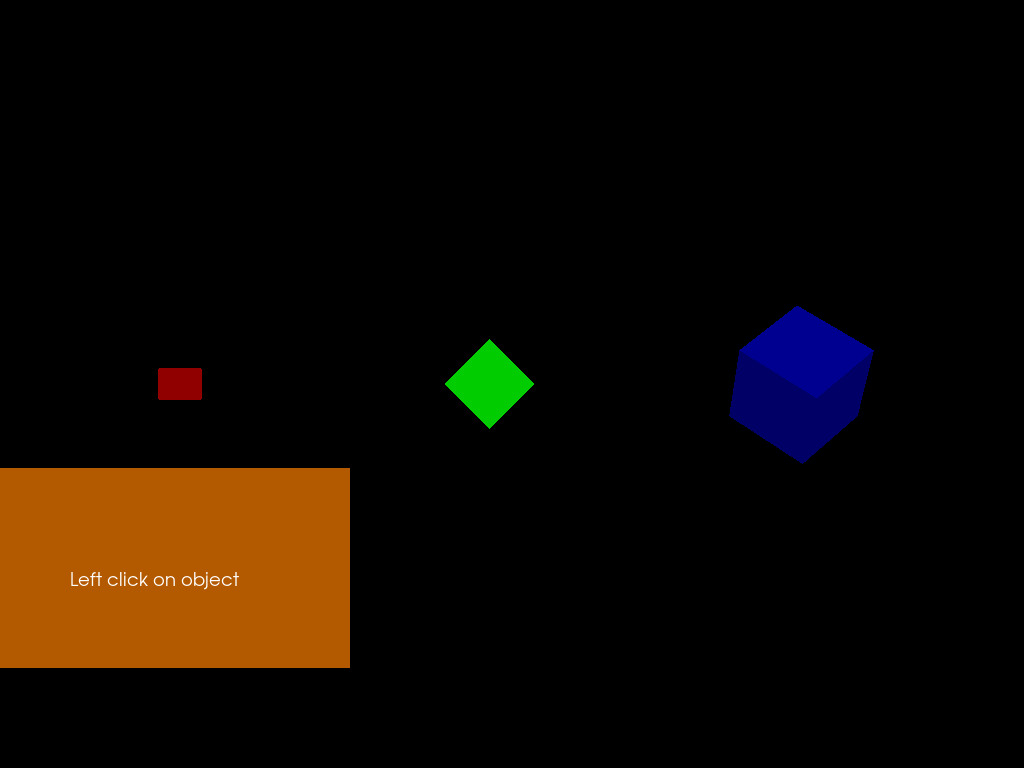Note
Go to the end to download the full example code
Simple picking#
Here we present a tutorial showing how to interact with objects in the 3D world. All objects to be picked are part of a single actor. FURY likes to bundle objects in a few actors to reduce code and increase speed.
When the objects are picked they will change size and color.
Let’s create a panel to show what is picked
panel = fury.ui.Panel2D(size=(400, 200), color=(1, 0.5, 0.0), align="right")
panel.center = (150, 200)
text_block = fury.ui.TextBlock2D(text="Left click on object \n")
panel.add_element(text_block, (0.3, 0.3))
Build scene and add an actor with many objects.
scene = fury.window.Scene()
label_actor = fury.actor.vector_text(text="Test")
This actor is made with 3 cubes of different orientation
directions = np.array(
[
[np.sqrt(2) / 2, 0, np.sqrt(2) / 2],
[np.sqrt(2) / 2, np.sqrt(2) / 2, 0],
[0, np.sqrt(2) / 2, np.sqrt(2) / 2],
]
)
fury_actor = fury.actor.cube(
centers, directions=directions, colors=colors, scales=radii
)
Access the memory of the vertices of all the cubes
vertices = fury.utils.vertices_from_actor(fury_actor)
num_vertices = vertices.shape[0]
num_objects = centers.shape[0]
Access the memory of the colors of all the cubes
vcolors = fury.utils.colors_from_actor(fury_actor, array_name="colors")
Adding an actor showing the axes of the world coordinates
ax = fury.actor.axes(scale=(10, 10, 10))
scene.add(fury_actor)
scene.add(label_actor)
scene.add(ax)
scene.reset_camera()
Create the Picking manager
pickm = fury.pick.PickingManager()
Time to make the callback which will be called when we pick an object
def left_click_callback(obj, event):
# Get the event position on display and pick
event_pos = pickm.event_position(showm.iren)
picked_info = pickm.pick(event_pos, showm.scene)
vertex_index = picked_info["vertex"]
# Calculate the objects index
object_index = int(np.floor((vertex_index / num_vertices) * num_objects))
# Find how many vertices correspond to each object
sec = int(num_vertices / num_objects)
if not selected[object_index]:
scale = 6 / 5
color_add = np.array([30, 30, 30], dtype="uint8")
selected[object_index] = True
else:
scale = 5 / 6
color_add = np.array([-30, -30, -30], dtype="uint8")
selected[object_index] = False
# Update vertices positions
vertices[object_index * sec : object_index * sec + sec] = (
scale
* (
vertices[object_index * sec : object_index * sec + sec]
- centers[object_index]
)
+ centers[object_index]
)
# Update colors
vcolors[object_index * sec : object_index * sec + sec] += color_add
# Tell actor that memory is modified
fury.utils.update_actor(fury_actor)
face_index = picked_info["face"]
# Show some info
text = "Object " + str(object_index) + "\n"
text += "Vertex ID " + str(vertex_index) + "\n"
text += "Face ID " + str(face_index) + "\n"
text += "World pos " + str(np.round(picked_info["xyz"], 2)) + "\n"
text += "Actor ID " + str(id(picked_info["actor"]))
text_block.message = text
showm.render()
Bind the callback to the actor
fury_actor.AddObserver("LeftButtonPressEvent", left_click_callback, 1)
1
Make the window appear
showm = fury.window.ShowManager(scene=scene, size=(1024, 768), order_transparent=True)
scene.add(panel)
Change interactive to True to start interacting with the scene
interactive = False
if interactive:
showm.start()
Save the current framebuffer in a PNG file
fury.window.record(scene=showm.scene, size=(1024, 768), out_path="viz_picking.png")

Total running time of the script: (0 minutes 0.096 seconds)
